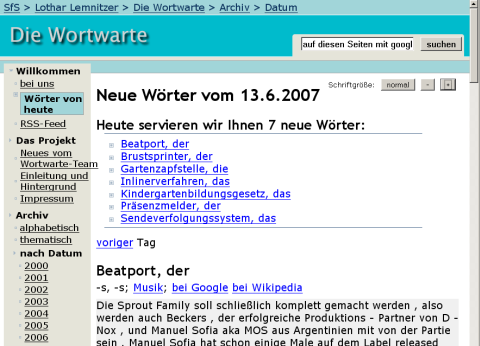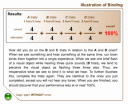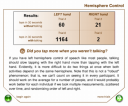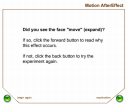It is difficult if not impossible to foresee future research results. I am sharing the belief with many other colleagues that grant applications are largely a waste of time (in particular if most applications fail). A recent correspondence letter in Nature applauds Continue reading How to predict good research
Category Archives: Philosophy
German science
The German portal academics has a rather long narrative about the failure of German science – and an excerpt from “Richard Münch, Die akademische Elite. Zur sozialen Konstruktion wissenschaftlicher Exzellenz, Frankfurt a.M.: Edition Suhrkamp, 2007”. Continue reading German science
10 simple rules
This is just to promote the 10 simple rules collection. Rule #1 for reviewers “Do Not Accept a Review Assignment unless You Can Accomplish the Task in the Requested Timeframe—Learn to Say No” is what I have learned only recently. The most important one is “Write Reviews You Would Be Satisfied with as an Author”.
A denial of service attack
The ever proliferating number of review requests comes like a denial of service attack – just like hacking attacks to high-profile web servers.
Best of all – however – it is a self limiting process. There is no more editor on the phone Continue reading A denial of service attack
Don’t let them hear you typing
Yes, some scientists can think and write pretty fast while others are much slower. Software created for the Dark Web Project of the Artifical Intelligence Lab U Arizona can measure that and identify an author by Continue reading Don’t let them hear you typing
Peer to peer publication
Although not so much appreciated by big companies, peer to peer technologies have a great success in sharing communities. Peer to peer might even work with mobile phones in Africa as shown recently by a Swedish company.
I wonder if peer to peer would also work. Continue reading Peer to peer publication
Cha cha cha
SPIEGEL online points to a retrospective of former SCIENCE editor Daniel Koshland on the science typologies challenge, chance and charge.
Challenge – putting the pieces together like the discovery of the DNA structure of Watson & Crick.
Charge – solving longstanding ubiquitous problems like gravity laws by Newton, a rare event.
Chance – events like the development of PCR by Mullis.
I could add cha-uvinism (ignoring previous work), cha-os (also called creativity), cha-racter (???), cha-rity (work for nothing), cha-rade (also called congresses), cha-pter (many to write), cha-lk (many lectures), cha-nge (not really), cha-mpion (a few), cha-ir (less), cha-ff (most), cha-rts (hundreds), cha-t and cha-rivari (always), yea,yea.
I had a dream tonight
I had a dream tonight. I do the final revision of a paper following many months of work and submit it to an internet server. Only 30 minutes later the first science journal agent contacts me offering immediate publication. More and more offers arrive and I finally decide to hand it over to nice publishing company that will pay so much money to continue my research.
I woke up and Continue reading I had a dream tonight
< I often only have time to read abstracts >
Sciencesque has an anonymous update of the impact factor and peer review discussion Continue reading < I often only have time to read abstracts >
An editor is one who separates wheat from chaff and then prints the chaff I
Here is a little tale that could have happened every day. An author sends a major paper to a major journal. The major journal has a major editor that asks other major reviewers before writing a major email. Continue reading An editor is one who separates wheat from chaff and then prints the chaff I
Question of the year in genetics
Nature genetics asked about 30 eminent scientists “What would you do if it became possibe to sequence the human genome for only $1,000?”. Unfortunately, this initiative has been launched 4 weeks too early as I believe some may have responded differentially if they could have a chance to read the ENCODE papers… The majority of scientists seems to follow the idea of Continue reading Question of the year in genetics
Wer heilt hat recht
This is a German quote – frequently used in the context of alternative medicine – “who heals is right”.
The history of the qutotation is unclear; maybe it is a modification of the Latin “extra ecclesiam salus non est” .
In todays English “the doctor’s always right” (or “might is right”?)
Anyway it is utter nonsense as (1) a healer wants to be successful and not rightful (2) healing (at least on a few occasions) is no proof for the right treatment only fo the good outcome.
Click chains
That seems a usual phenomenon now: I am reading an interesting article (at Edge), want to know more about an author (Fitch) and end at a storming website at University of Tübingen (recording new German words). German linguistics seem to merge day after day with English linguistics.

A little scientific experiment for you
Here is a little scientific experiment for you – click wadsworth.com/psychology_d. My results:




(had to answer a phone call during the third trial ;-)
Too much checking on the facts has ruined many a good news story
So far I naively quoted others – “only to better express myself” (Michele de Montaigne). This will, however, change now after having read “The Quote Verifier – who said what, where and when” by Ralph Keyes. He nicely explains in the foreword that the misattribution process is not random Continue reading Too much checking on the facts has ruined many a good news story